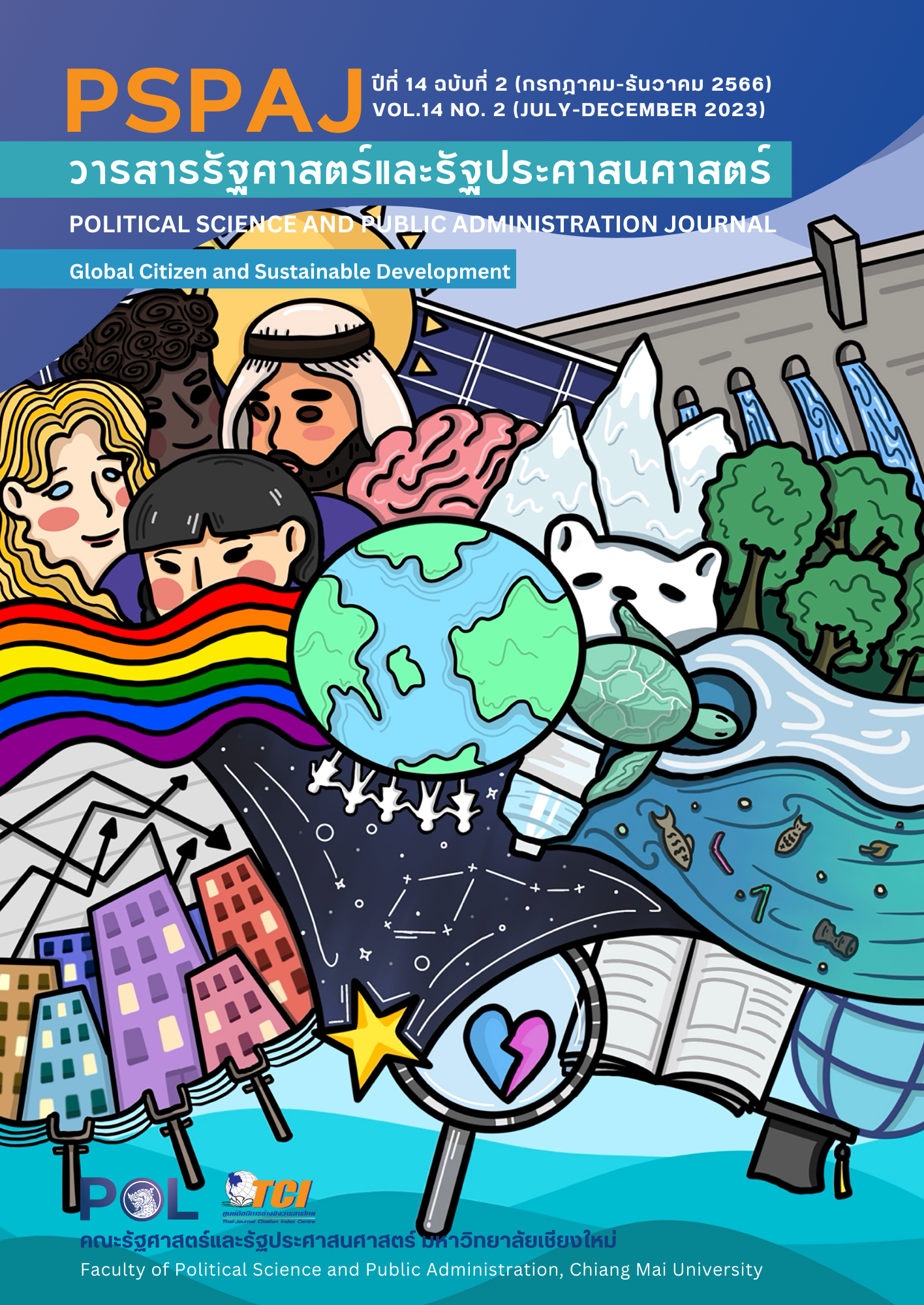An Intellectual Review of the Origin of Chinese Citizenship: A Case Study of Liang Qichao
Main Article Content
Abstract
Research on citizenship in Thai academia usually draws from western experience as a primary source of reference. This study, however, shifts its focus to the origin of Chinese citizenship, aiming to address the existing gap in Thai academic discourse on citizenship studies. Furthermore, this research aims to fill the knowledge gap on modern Chinese history in Thailand by delving into intellectual movements of the time. Specifically, it examines the intersection of Chinese citizenship and the process of nation-state building. This research employs historical approach with a particular emphasis on intellectual history. Through this lens, the study uncovers the historical evolution of Chinese citizenship and transformative context of the late Qing era. A key component of the analysis is the examination of "Xinmin Shuo," a work authored by Liang Qichao. The findings of this research underscore the pivotal role played by Liang's work in defining Chinese citizenship. The definition of Chinese citizenship defined by Liang, who emphasized the superiority of state over citizen, exerts lasting influence on the subsequent eras' state-citizen relationship.
Downloads
Article Details

This work is licensed under a Creative Commons Attribution-NonCommercial-NoDerivatives 4.0 International License.
- เนื้อหาและข้อมูลที่ลงตีพิมพ์ในวารสารรัฐศาสตร์และรัฐประศาสนศาสตร์ถือเป็นข้อคิดเห็นและความรับผิดชอบของผู้เขียนบทความโดยตรง ซึ่งกองบรรณาธิการวารสารรัฐศาสตร์และรัฐประศาสนศาสตร์ ไม่จำเป็นต้องเห็นด้วย หรือร่วมรับผิดชอบใดๆ
- บทความและข้อมูล ที่ได้รับการตีพิมพ์ในวารสารรัฐศาสตร์และรัฐประศาสนศาสตร์ ถือเป็นลิขสิทธิ์ของวารสาร หากบุคคลหรือหน่วยงานใดต้องการนำข้อมูลไปใช้ประโยชน์ในทางวิชาการ ขอให้อ้างอิงแหล่งที่มาด้วย
References
กรพนัช ตั้งเขื่อนขันธ์. (2565). ประวัติศาสตร์จีนสมัยใหม่. กรุงเทพฯ: เสริมวิทย์บรรณาคาร.
โกวิท วงศ์สุรวัฒน์, และวาสนา วงศ์สุรวัฒน์. (2565). ประวัติศาสตร์จีนหลังเหมา. เชียงใหม่: ซิลค์เวอร์ม.
ถวิลวดี บุรีกุล, เออเจนี เมริโอ, และรัชวดี แสงมหะหมัด. (2557). พลเมืองไทย: การสร้างความเป็นพลเมืองในระบอบประชาธิปไตย. กรุงเทพฯ: สถาบันพระปกเกล้า.
ทศพล สมพงษ์, สมเกียรติ นากระโทก, และถวิลวดี บุรีกุล. (2563). การศึกษาพฤติกรรมความเป็นพลเมืองสำหรับสังคมไทย. กรุงเทพฯ: สถาบันพระปกเกล้า.
ธเนศวร์ เจริญเมือง. (2548). แนวคิดว่าด้วยความเป็นพลเมือง. นนทบุรี: สถาบันพระปกเกล้า.
ปริญญา เทวานฤมิตรกุล. (2555). การศึกษาเพื่อสร้างพลเมือง. กรุงเทพฯ: สถาบันสัญญา ธรรมศักดิ์ เพื่อประชาธิปไตย.
พิณสุดา สิริธรังศรี. (2560). การพัฒนาการศึกษาเพื่อความเป็นพลเมือง. สุทธิปริทัศน์, 31(100), 100-113.
เลิศพร อุดมพงษ์. (2562). การศึกษาเพื่อสร้างความเป็นพลเมือง (Civic/Citizenship Education) ในการส่งเสริมบทบาทของ ภาคพลเมืองในการเมืองระบบตัวแทน: แนวทางที่ยั่งยืนผ่านประสบการณ์จากต่างประเทศ. สืบค้นเมื่อ 20 สิงหาคม 2566, จาก https://www.kpi.ac.th/knowledge/research/data/257
ศักดิ์ชัย นิรัญทวี. (2548). การจัดการเรียนรู้เพื่อพัฒนาผู้เรียนให้เป็นพลเมืองดี. กรุงเทพฯ: สำนักงานเลขาธิการสภาการศึกษา กระทรวงศึกษาธิการ.
สถาบันพระปกเกล้า. (2555). ความเป็นพลเมืองกับอนาคตประชาธิปไตยไทย. กรุงเทพฯ: สถาบันพระปกเกล้า.
สยุมพร ฉันทสิทธิพร. (2565). ความสัมพันธ์ระหว่างตำราต้าเสฺวียกับตำราจงยง. วารสารจีนศึกษา มหาวิทยาลัยเกษตรศาสตร์, 15(2), 292-316.
สำนักงานเลขาธิการสภาการศึกษา. (2554). การสร้างความเป็นพลเมือง ณ สาธารณรัฐประชาชนจีน. กรุงเทพฯ: สำนักงานเลขาธิการสภาการศึกษา กระทรวงศึกษาธิการ.
สิทธิพล เครือรัฐติกาล. (2555). ประวัติศาสตร์จีนสมัยใหม่. กรุงเทพฯ: ชวนอ่าน.
เอนก เหล่าธรรมทัศน์. (2550). ประชาธิปไตยที่ประชาชนปกครองตนเอง. ใน เอนก เหล่าธรรมทัศน์ (บก.). การเมืองของพลเมือง: สู่สหัสวรรษใหม่ (น. 55-70). กรุงเทพฯ: โครงการจัดพิมพ์คบไฟ.
Burtscher, M. (2012). A Nation and A People?: Notes toward a Conceptual History of the Terms Minzoku 民族 and Kokumin 国民 in Early Meiji Japan. Journal of Political Science and Sociology, (16), 47-106.
Cao, Q. (2022a). The Lure of Utopia: Reinterpreting Liang Qichao's Xinmin Shuo, 1902-1906. In Margolies, D., & Cao, Q. (Eds.) Utopia and Modernity in China: Contradictions in Transition (pp. 11-32). London: Pluto Press.
Cao, Q. (2022b). The Discourse of Xinmin: Mindset Remodeling and Nation-building in Early Twentieth-century China. Chinese Language and Discourse, 13(1), 122-142.
Chang, H. (1971). Liang Ch'i-ch'ao and Intellectual Transition in China, 1890-1907. Cambridge, Massachusetts: Harvard University Press.
Connors, M. K. (2003). Democracy and National Identity in Thailand. London: Routledge Curzon.
Culp, J. R. (2012). Theorizing Citizenship in Modern China. Journal of Political Science and Sociology, (16), 123-148.
Fogel, J. A., & Zarrow, P. G. (1997). Imagining the People: Chinese Intellectuals and the Concept of Citizenship, 1890-1920. Armonk, New York: M.E. Sharpe.
Goldman, M., & Perry, E. J. (2002). Introduction: Political Citizenship in Modern China. In Goldman, M., & Perry, E. J. (Eds.). Changing Meaning of Citizenship in Modern China (pp. 1-19). Cambridge, Massachusetts: Harvard University Press.
Guo, Z. (2022). Routledge Handbook of Chinese Citizenship. New York: Routledge.
Harris, P. (2002). The Origins of Modern Citizenship in China. Asia Pacific Viewpoint, 43(2),181-203.
Hsu, C. L., & Hildebrandt, T. (2022). The Construction and Performance of Citizenship in Contemporary China. The Journal of Contemporary China, 31(138), 827-843.
Huang, P. (1972). Liang Ch'i-ch'ao and Modern Chinese Liberalism. Seattle, Washington: University of Washington Press.
Lee, T. M. (2007). Liang Qichao and the Meaning of Citizenship: Then and Now. History of Political Thought, 28(2), 305-327.
Levenson, J. R. (1959). Liang Ch'i Ch'ao and the Mind of Modern China. Cambridge, Massachusetts: Harvard University Press.
Li, B., & Wu, Y. (1999). The Concept of Citizenship in the People's Republic of China. In Davidson, A., & Weekley, K. (Eds.). Globalization and Citizenship in Asia-Pacific (pp. 157-168). London: Macmillan.
Liu, L. (2007). Cai Hesen: A Provincial Scholar Becomes a Young Radical. Twentieth-Century China, 32(2), 84-110.
Liu, L. H. (1995). Translingual Practice Literature, National Culture, and Translated Modernity—China, 1900-1937. Stanford, California: Stanford University Press.
Matten, M. A. (2012). China is the China of Chinese: The Concept of Nation and Its Impact on Political Thinking of Modern China. Oriens Extremus, 51, 63-106.
Tang, X. (1996). Global Space and the Nationalist Discourse of Modernity: The Historical Thinking of Liang Qichao. Stanford, California: Stanford University Press.
Liang, Q. 梁启超 (2013). Xinmin shuo新民说 [ว่าด้วยประชาชนใหม่]. Beijing: Zhongguo wenshi chubanshe.


